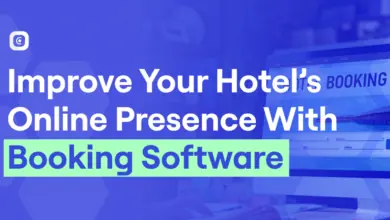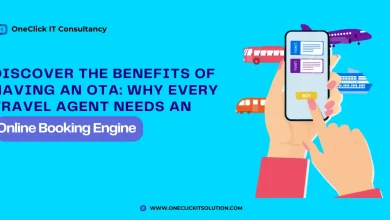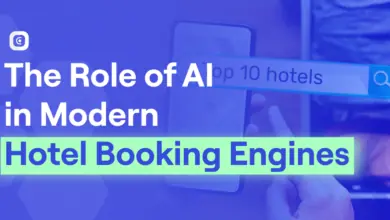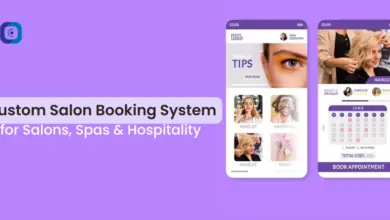The Tech Behind Easy Travel: A Look at Online Travel Booking Engine
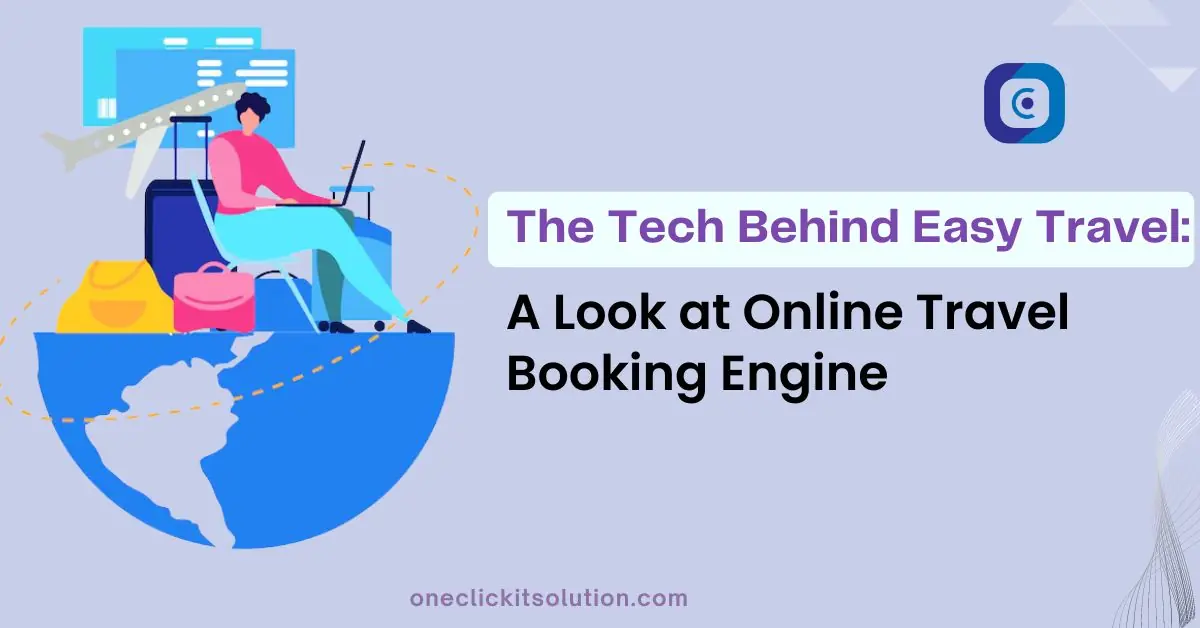
Have you ever considered how online travel bookings have been made so easy? The simplified tech behind the user-friendly online booking engines that blend real-time with different types of available data has made it simple to try hands-on, hassle-free trip planning at a fair distance.
How an Online Booking Engine Works
An online booking engine for travel agents is a web application developed to make bookings faster and easier for travel agents, car rental companies, hotels, and every other travel service. It is also connected to the agency’s website, property management system, or database. Thus, the booking engine allows the end customer to purchase the reservation, pay for it online, and immediately get a booking date confirmation from the service provider as online booking engines for travel agencies.
The following are features of the travel booking engine:
1. Website Integration:
The online booking engine links to the company’s website. It displays an availability calendar, which allows the customer to browse available dates, view the price duration, and complete the reservation. This engine also links to the inventory database, ensuring that the clients view the photo taken and can only book what is available.
2. Inventory Management:
The booking engine is linked to the company’s inventory database, ensuring that all clients’ availability and pricing data are current. Aspects such as dates, duration, vehicles, room, and all filters must be seen. Customers can refine their searches by sorting by parameter to locate the appropriate room or vehicle.
3. Search and Filter Processing:
The tool enables clients to search for services using several filters to customize the results by location, basic needs, or price. Clients can drill down with various filters to arrange the results according to their specifications.
4. Booking Integration:
Once the client has paid for the service, the booking engine connects to the property or central reservation system to create and manage the reservation. It sends the request to the database to keep this information current.
5. Confirmation and Itinerary:
After the client has reserved, the booking engine creates a discount message or a common name with the reservation code and then the client’s itinerary times for arrival, release or additional fingers to notice from here.
6. Channel management:
Booking engines are linked to a channel management system that permits clients to join other online travel agencies to distribute their available services. Proper training helps them make a lot of profit. Booking engines have reporting and analytics systems, but we do not include everything. Moreover, it is very technical for the booking engine. Therefore, we help an organization create a link between the internet and them.
Benefits of Online Travel Booking Engine
Leveraging online booking engines for travel agencies has several benefits for travel agents, travelers and tour operators. These platforms empower businesses, facilitate customer support, and ensure growth in the following ways:
The leading benefits of online travel booking engine software include the following:
1. A booking engine would allow customers to book flights, hotels, car rentals, tours and transfers, packages, and many other services directly through the travel agency’s or tour operator’s website or proprietary smartphone app.
2. With online booking engine travel agents, a travel agency can be open to the world, reaching out to a much broader client base beyond the local market. Better visibility afforded by an online presence can help attract more clientele and grow the business.
3. The availability of online booking and booking inquiry capture operates 24/7, reflecting the customers’ ability to complete their research and booking at any time, free from traditional business hours. It also means no inquiry is lost by forgetting or difficulty locating the sticky note, as the inquiry lands in the booking engine inbox.
4. A booking engine allows for the display and sale of various travel products, such as flights, hotels, car rentals, vacation, and excursion packages.
5. Another product feature is dynamic packaging, enabling customers to combine flights, hotels, and other services in a proper bundle. Such consolidation ensures a highly customized client experience and impresses customer satisfaction.
6. Good booking engines allow sorting and filtering features to make it easy for consumers. This allows customers to sort their travel options as they wish, based on their departure and arrival times, the prices of the services, amenities, and more.
7. With this feature, customers feel on top of the world! They feel like they have all the information they need to make the best decisions for their travel.
8. Booking engines can be designed to be filled with engaging and informative content, including destination photos, hotel amenities, customer reviews, and maximum ratings. This information is crucial in helping the customers make the proper choice and feel more at ease when spending money on an agency’s offer.
9. The ideal booking engine also offers price comparisons across travel arrangements, suppliers, packages, and more to help customers find the best deals according to their preferences and travel budgets.
10. Booking engines make managing taxes, markups, profit margins, and supplier lists easier, resulting in effective and hassle-free management.
Feature of Online booking engines
Online booking engines travel present many features facilitate a seamless, integrated booking experience. The following are some of the typical booking engine options:
1. Online Booking Capabilities:
The primary and most critical booking engine attribute is the ability to book routes, rooms, cars, and booking, insurance, transfer, or activities with other travel suppliers so the consumer can book online via an intuitive and simple app.
2. Responsive Design:
Today, devices like desktops, tablets, and smartphones are used. Thus, the booking engine was designed and adjusted for easy use on different devices.
3. Packaged Holidays:
Booking engines often have pre-packaged holiday offers that combine the selected flight options, accommodation, and other components to offer a complete and possibly more convenient and affordable bundle.
4. Dynamic Custom Itinerary Builder:
Some booking engines allow customers to choose and combine the components into a personally tailored itinerary by offering options for comparison and selection.
5. Margin Management:
Booking engines manage margins for travel agencies and tour operators as a travel platform development to set and edit markups and profit margins on their travel products and services.
6. Multiple Language and Currency Support:
Booking engines support multiple languages and currencies designed to accommodate their global audience. This ensures customers experience the booking engine in the localized language.
7. GDS Integration:
Booking engines are typically connected to major gds systems for travel agents using XML links. This connection provides access to a wide array of travel products, prices, and availability in real-time.
8. Website Integration:
Many booking engines have integration capabilities, offering a seamless experience where the booking engine is embedded into the user’s website. This ensures a branded and cohesive customer experience that fits within the larger content of the user’s website.
9. Multiple Payment Gateways:
As more consumers use web-based transactions, booking engines support integration with various payment gateways. The gateways ensure seamless, secure, and convenient payments. Payment integration ensures customers can use preferred payment methods such as credit cards, debit cards, or online platforms.
10. Supplier Management:
A booking engine must have supplier management that allows businesses to control their supplier relationships. The tool also lets users negotiate rates, uphold contracts, and make live contracts based on availability.
The Online Hotel Booking Process

Online booking system for tours and activities refers to guests booking accommodation on your website and paying from there. While the backend management function is an added advantage, the main objective is to help your customers make their reservations as easily as possible.
Nowadays, all their hotels are powered by technology, and almost all apply for online booking. This process can be confusing and scary to a new student. For this reason, this essay offers a step-by-step guideline to give them a clear picture of how they can easily book a hotel room.
Step 1: Selecting the Travel Service
Major travel agency websites display a variety of services front and center, including flight, hotel, car rental, and packages bundling several services together. Therefore, the first step is to understand which service you need: in my case, if I plan a vacation trip, it will be reserving a convenient hotel.
Step 2: Choosing Travel Dates and Destination
After selecting the desired service, you will be provided with multiple alternatives. Therefore, you should consider the dates of your arrival and departure and choose concrete and relevant terms for your trip. In addition, it is recommended to explore different components, such as weather and the presence of any events or festivals that may positively influence your journey.
Step 3: Selecting Specific Travel Options
It is important to choose the correct room type to match the number of people for whom you will make an order. Our reservation system will offer suitable options, and you will do everything quickly and without particular difficulties. You can also find information about each hotel on our website, including its address, photos, descriptions, room rates, amenities, and rules.
Please review the information to find the hotel that suits you and is affordable for you. Enter the arrival and departure dates, the type of room you want to receive, and the number of adults and children. Click on “Find” or “Done” if you are ready.
Step 4: Entering Guest Information
Upon selecting the favored hotel and defining the booking procedure, the student may proceed with booking. You are required to fill in fields like your first and last name, phone number, e-mail address, type of room, and number of attendees.
Step 5: Payment
Since online payments have increased, clients are offered different options, from bank cards and credit cards to a particular company or an online wallet.
There are also types of agencies that send a courier to collect cash. Each type may be subject to a discount or want to make a promotion, so it only remains to choose the most profitable type. Some agencies and hotels can offer to pay only for the first days at the hotel and settle the balance later. Primarily, do not forget to clarify with the provider.
Step 6: Booking Details Review and Confirming
After you make the payment, you will receive a confirmation email with a booking confirmation receipt. This email also contains a booking code, which is important and necessary when entering your hotel room. Stay assured.
Step 7: Carefully Check the Confirmation Receipt
Carefully review the confirmation receipt to find that everything mentioned is indeed accurate. Look closely at the check-in and check-out dates, the agreed room rate, the number of rooms, and anything else included in your booking. If everything appears to be in order, we are good to go. Lean back and look forward to your journey.
Choosing the Right Online Travel Booking Engine Software
Finding the right reservation software for your travel and tourism business can be the key to success, and it may be harder. There are plenty of free options, and though they may seem appealing, lack crucial functionality and features that will hinder your business development and efficiency.
Meanwhile, there are multiple advantages to paid online travel booking engine software, making the investment worth its value. Every paid system is rich in features and integrates customer support teams to help you from the setup to the problem-solving stage of your system utilization. Not to mention that paid systems are more reliable, better secured, and do not have recurring costs and commissions. When choosing the right travel reservation software for your business, one should consider the following factors:
1. Cost Factors
Pricing models of travel reservation software can differ widely. Agreements that require one-time payments, monthly subscriptions, per bookings based commission, and, in some cases, contain training, installation, or support costs are all possible. Reviewing and exploring these cost components are critical for ensuring that a solution conforms to the cost plan and complements the business’s end goals.
2. Customizability
Although software with specific features might be easier to install and use, it is important to recognize the need for a high level of flexibility. Customizable software can have various modules added or removed to meet the business’s unique needs. Thus, a customizable software system is often the best for personalization and efficiency.
3. Website Integration and Mobile Apps
Ensure your travel business has a well-established and properly integrated online presence, including a comprehensive website and a well-functioning mobile app. Find a travel reservation software service provider that can integrate their offerings into your website and help you develop a mobile application. This will improve customers’ online visiting experience and your online operations, enabling efficient handling of bookings and responding to customer inquiries on various platforms.
4. Dedicated Support and Continuous Improvement
When you invest in your travel reservation software, you should also consider how much support and development the vendor offers. A dedicated support department can make a big difference when fixing critical data problems, technical crashes, or anything else you might not have planned. Also, go for a supplier that keeps your software relevant by taking regular updates and consistently aligning the most recent features to remain compatible and up-to-date with you.
5. Research and Comparison
Choosing the right travel reservation software is a significant decision that is bound to impact your business’s success, growth, and relevance. Therefore, do not be in a rush to conclude the search. Instead, take the time to consider all the available options and evaluate them cautiously before picking on the most suited for your business.
Conclusion
Due to the great significance of technology in the modern world, the travel industry also leverages it. To provide travelers from all across the globe with a seamless and accessible experience. One of the most crucial tools in this area is the online travel booking engine that has revolutionized planning and arranging trips.
This great innovative technology has significantly simplified and accelerated the process of booking for travelers, enabling them to simply enter the site, look for the best prices and availability, and book suitable transportation or accommodation from their comfortable home or anywhere on the go from a phone or a laptop. Using real-time inventory sharing, easy payment gateways, and customized recommendations, booking engines enable travelers to make their own decisions.
If you are a player in the travel industry and your goal is to make the most of the benefits of booking engines, you should get in touch with a partner, One Click IT Consultancy. Our team of experts will provide you with the service you need to stay apart from the current in the industry. Contact us today.


